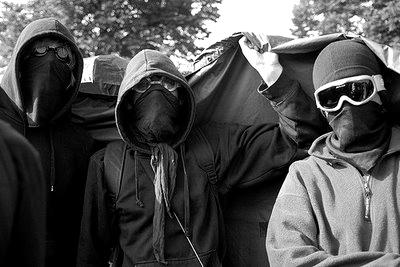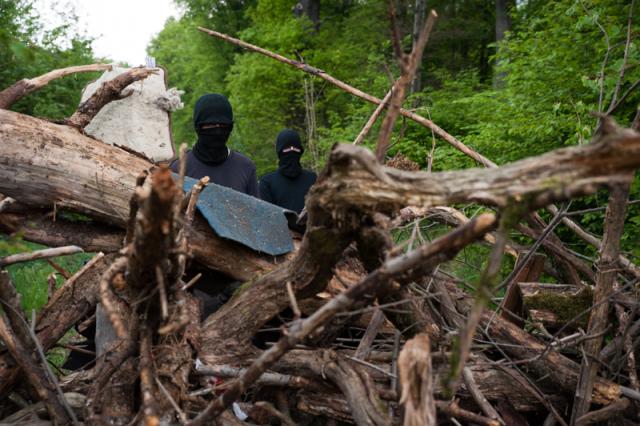

Network for Police Monitoring (Netpol) co-ordinator Kevin Blowe explains why the organisation encourages activists to mask up.
 Image: EZLN supporters in Chiapas, Mexico
Image: EZLN supporters in Chiapas, Mexico
Originally published by Earth First! UK‘s spring 2017 zine
In June 2015 Netpol launched a campaign to try to encourage activists to start covering their faces when taking part in demonstrations and marches.
We saw this initiative as one of the few remaining ways of resisting the growth of intrusive surveillance on the streets, which sees police monitoring social media for images and live-streamed video, chatting to protesters in the guise of ‘facilitating’ their activism and routinely filming everyone. This data-gathering is overwhelmingly overt rather than involving undercover officers — and most of the information is handed over by ourselves without objection. It is also carried out on an almost industrial scale, intended to build up a picture of different social movements, their structures and alliances.
Netpol therefore crowdfunded the purchase of 2,000 face coverings and then gave them away for free at the People’s Assembly Anti-Austerity demonstration in London. Hundreds took them and ever since, the “Netpol masks” have popped up on all kinds of — even in Calais. We even received the honour of an attack article from the Mail on Sunday — which was later forced to pay us for stealing an image from our website.
It was great fun but ultimately, we failed in our main goal. Netpol has not significantly changed people’s attitudes towards covering up against surveillance and away from the perception of a mask as a stereotypical symbol of a “violent” (and thus invariably delegitimised) minority. There were notable efforts by a few protesters at a student march later in 2015 but the idea has not spread. Instead, we are often asked when we will “produce more face masks” when what we really want is for people to make their own.
It’s important to ask why is it that the idea of covering up your face during a protest is accepted as normal and commonplace in many other parts of the world, from the US to South East Asia, but not in Britain? Perhaps the problem is that if you want to try and change deeply embedded perceptions you need to offer a positive political argument, not just a tactical one.
Many campaigners know the tactical arguments well. They know that intelligence is used by the police to create a picture of the structures, sustainability and strengths of protest groups, in order to develop ways to undermine them. It is undoubtedly used too to identify possible targets for undercover policing and to help “embed” undercover officers. Mass surveillance now enables the targeting of individuals within a crowd and offers the police a strategic advantage — a way to divide protestors into “good” and “bad,” isolating particular groups to make it easier to control crowd behaviour.
The result is a weakening of the collective sense of safety and solidarity that a rally or demonstration provides. It also means prominent campaigners or “organisers” are subjected to visits or letters to their home, are repeatedly followed around or targeted in their workplaces. Faced with this level of overt surveillance on the streets, one way to provide greater protection of protesters’ privacy is wearing a face covering or mask – not a few people, but everyone.
That’s the tactical argument. So what about the political ones?
Firstly, as Bane in The Dark Knight Rises explained so succinctly, wearing a mask is not just about covering up, but about being seen.
Perhaps a better example is the lesson we can learn from groups like the Zapatista EZLN in Mexico (pictured above), where wearing masks is commonplace and has a dramatic and powerful impact — it is a way for indigenous peoples who have been ignored for centuries to finally ensure their collective actions do not go unseen. “We cover our faces,” they say, “so we are visible.”
Many campaigners in the UK feel that their own protests are often ignored too, unless they happen to fit a pre-conceived and usually negative media narrative designed to marginalise their demands. Imagine, then, the impact of thousands of people taking to the streets with their faces covered?
Secondly, the Zapatistas argue that hiding your face in public demonstrates a rejection of “normal” or traditional representative or party politics, involving “spokespersons” and judgements about individual respectability and appearance that “represent” parties and their members.
This idea that everyone, regardless of their identity, can participate in consensus decision-making is also core to our beliefs, as is a rejection of hierarchy and authoritarianism.
A protest can and should represent a celebration of this kind of collective action and of direct democracy, one in which, in the words of the EZLN’s Subcommandante Marcos, “the mistakes are conjugated in the first person singular and the achievements in the third person plural.”
Hiding your face in public means the state cannot distinguish who is in charge — because no one is, because everyone is.
Thirdly, collectively covering up our faces represents a commitment to equality and a choice to try and include those who might otherwise feel excluded.
A common liberal argument against wearing a mask says that protest is about taking a public stand in support of individual beliefs. If you cover your face, the argument goes, you are refusing to take personal accountability for how you act in support of those beliefs.
There is, of course, some truth in this, although on the streets at protests we are making a collective stand, not just an individual one. Our presence together — often as part of a wider movement nationally or globally — is what makes a protest a success.
However, as we debate the question of taking a public stand, it is important to remember the degree of privilege that is contained in asserting it. For many, a right to anonymity may represent the main deciding factor about whether they are willing or able to “stand up and be counted” at all, rather than it acting as a barrier to doing so.
There are many examples of this. They include international students who are worried about the possibility that their participation in a demonstration might impact on their studies. Some young people may feel unable to take part in a protest about LGBTQ rights because they haven’t come out or fear the backlash if they are seen at a demo.
Netpol has spoken to education and youth workers have been warned that their participation in anti-EDL demonstrations would have a detrimental impact on their careers, or even lead to dismissal. Antifascists and hunt sabs have concerns that their faces might end up on a far-right website or targeting by hunt supporters.
Young Muslims too may feel understandably wary of unwarranted attention from the government’s snooping project Prevent if they demonstrate on many issues (including the damage caused by the programme itself). People awaiting the outcome of asylum claims may not want immigration services to know they have been politically active and may worry about negative consequences for relatives in their country of origin (something Congolese protesters told Netpol in 2011).
Not all these issues are about police — but they are all about whether we want movements that are genuinely open and equal and that overcome obstacles to participation.

Image: Hambacher Forrest defenders in Hambach, Germany.
It’s Not Just About Black Bloc
Fourthly, wearing a mask needs to become more than something associated solely with “black bloc” tactics.
I have no argument whatsoever with black bloc — they are simply tactics and sometimes people feel they are necessary and other times not. However, the idea that wearing a mask is associated ONLY with this tactic is damaging and illogical.
Wearing a face covering is not simply about individuals concealing their identities completely. This is why, whenever I have led workshops on this issue, I often become increasingly frustrated by debates about whether masks, face paint or sunglasses offer a better means of hiding your face. For me, this line of discussion is a massive distraction.
In practice, we are faced with the overarching power of the state and the continued expansion of the mass police surveillance I mentioned earlier. Soon, every police officer will wear a video camera. As Edward Snowden’s whistleblowing has shown us, surveillance on the streets is just one part of even more widespread State intrusion into our everyday privacy.
In these circumstance, all most of us can do — unless we choose to stop protesting altogether — is disrupt and resist police surveillance, not pretend we can hide from it completely. This means, once again, focusing on covering up as a mass, collective act of resistance, not just an individual choice.
Until then, many of the criticisms levelled at covering your face are essentially true. If you are arrested and tried, the courts DO tend to view covering your face as an aggravating factor, or a legitimate indicator of intent to commit disorder.
Rightly or wrongly, masks ARE seen as emblematic of the use of violence by protesters. They DO alienate wearers from allies who reject an association with violence or are simply fearful of a violent reaction from the police if they associate with people wearing masks. Wearing a mask DOES attract immediate attention from the police and is more likely to lead to protesters facing arrest or a stop-and-search.
None of this is going to change until we take the idea of mass protest anonymity seriously.
A Call to Action
If everyone attending a protest decides to wear a face covering, at every protest, we remove control of its symbolism from the state and the media, from those who want to denigrate and undermine our movements.
Instead, we turn it into a symbol of our collective solidarity and of our rejection of intrusive police surveillance.
Rather than waiting for an organisation like Netpol to start producing face coverings, we need people to use their own initiative to make their — and not just in black, but in every colour. And then to keep doing so.
The next opportunity to act is the next protest that faces intensive surveillance. It’s the ideal time to start resisting.
Kevin Blowe
Enough is enough